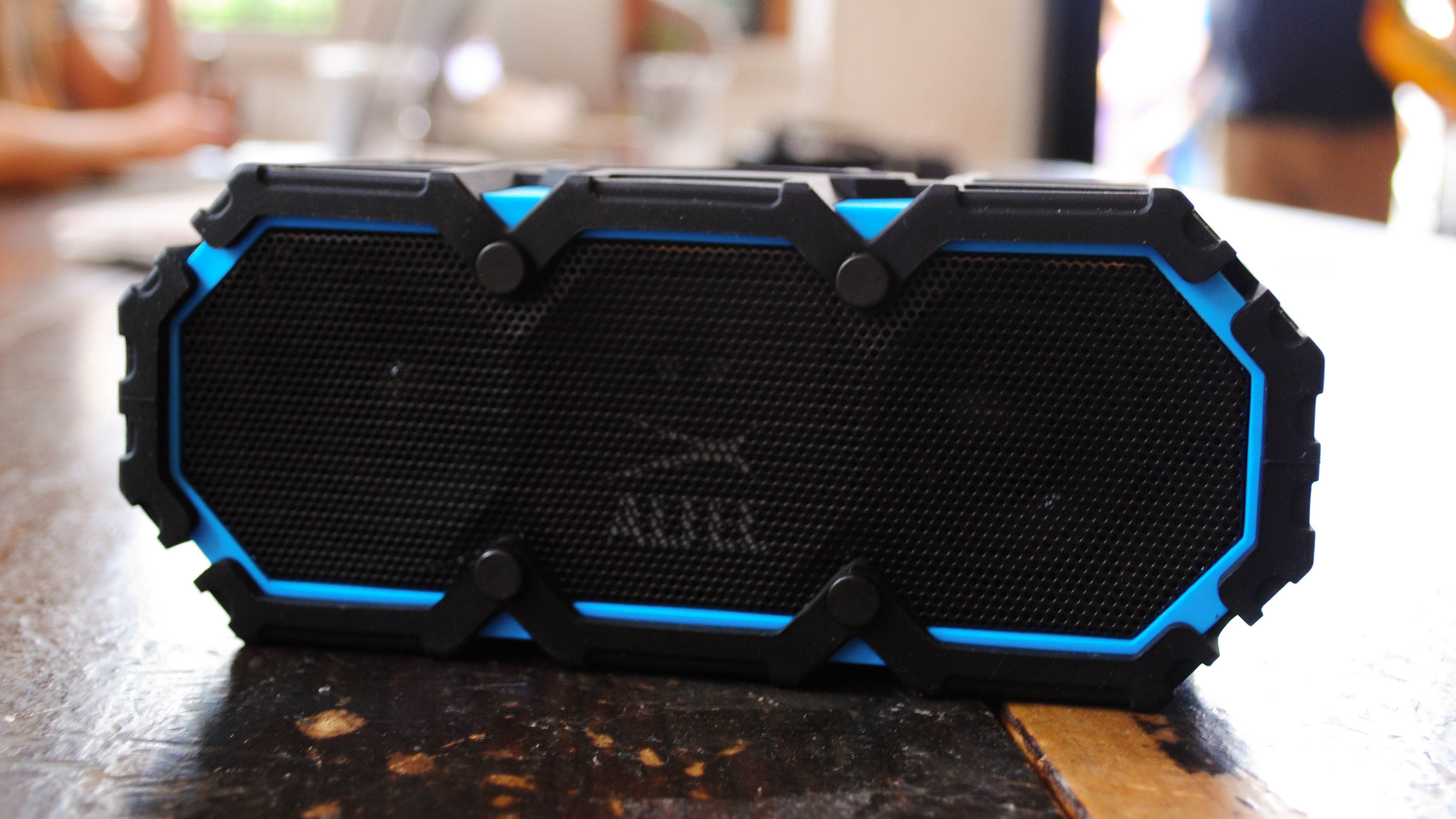TechRadar Verdict
If the sound performance of Altec's LifeJacket excelled to the level of its strong build, we'd recommend it. Unfortunately, aside from awesome battery life, the rest of the offering doesn't stack up to be a good value.
Pros
- +
Long battery life
- +
Durable against elements
Cons
- -
Tacky design
- -
Poor sound quality
Why you can trust TechRadar
For the outdoorsy types, sound quality might not be the main selling point of a Bluetooth speaker. A rugged build, for example, is likely a more important feature when considering options.
If your outdoor activities don't demand a good sounding speaker, but an extremely durable one, the $150 (about £133, AU$188) Altec LifeJacket couldn't be more up your alley. But for those of us who aren't adventurers, or even occasional campers, the subpar sound quality and clunky design leave a lot to be desired.
Design
The Altec LifeJacket is built with its focus narrowly on durability, and its design reflects that choice in ways both good and bad. The good is that the layers of silicon wrapping around the device evoke a rather playful vibe. The bad is that these materials used to boost durability lack sophistication and end up looking cheaper than its price suggests.
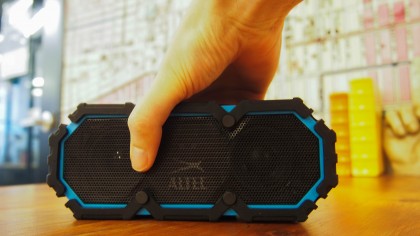
The LifeJacket is shaped like an elongated octagon and although it's mighty thick, you can still grab it one-handed. Coming in at 2 pounds, it isn't too light, so don't drop it on your feet. The speaker unit of the LifeJacket is housed in hard plastic, but you'll never see it, unless you try to sneak a peek underneath the two layers of blue and black protective silicon.
On its front, there's a black grille spanning the entire width, which prevents the dual two-inch drivers from getting dinged. Underneath this perforated screen, Altec stamped some subtle branding that thankfully doesn't stick out too much. Right above it, you'll find two LEDs that provide visual feedback for the speaker's battery and Bluetooth connectivity status.
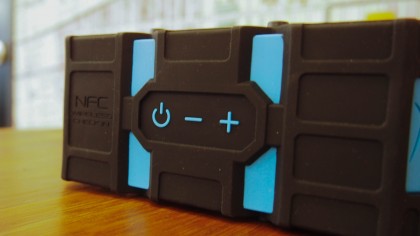
Moving to the top of the LifeJacket, a few features greet you. Sticking out in the middle is a panel of buttons (power, decrease volume, increase volume) that give the speaker some functionality if your paired device isn't within reach. Right next to it is a labeled site where you can tap your NFC-compatible device for quick, no-fuss pairing over Bluetooth.
Making our way to the back, things look similar to the front. It has a grille spanning the width of the speaker, except here it covers one passive radiator, which helps the speaker provide a little "oomph" on the low-end of the sound spectrum. On the left side of its rear, there are a few ports that can be – and should be, if you're coming into contact with the elements – covered by a removable silicon flap. There's a micro USB charging port, a 3.5mm input for listening to your wired devices and a plain USB port for charging devices that need some extra juice from the speaker's battery.
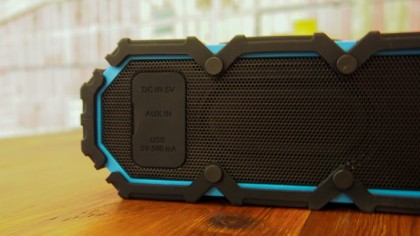
Altec included a 3.5mm cable in case your device doesn't support Bluetooth, or in case you just want to save some battery. Also in the box is a micro USB to USB cable, which can be used to charge the LifeJacket either through a computer, or with the power adapter that Altec included. Not that you'll need it for protection, as this speaker is good at taking care of itself, but there's also a tote to carry the LifeJacket around in.
Performance
In terms of design, the Altec LifeJacket isn't necessarily good-looking, but it succeeds in providing durability to stand up to the elements. Similarly, when speaking on its performance capabilities, the speaker doesn't exactly sound fantastic, but the battery lasts a long time and it performs with grace under water, dust and pressure, which makes it a winner for the outdoors.
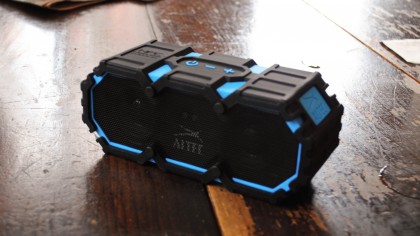
The LifeJacket has an impressive IP67 rating, which ensures that the speaker can survive an onslaught of dust and can be submerged in water safely up to a depth of one meter. On top of being able to survive being submerged, it can float in water, which is a neat feature that we also appreciated having in the Monster SuperStar BackFloat. The only downside is that the sound fires directly upward when floating, which leaves the audio rather tough to hear.
Speaking of sound, I was left with the impression that it isn't, or shouldn't be, the primary reason that you invest in this speaker. I excitedly whipped this speaker out for its inaugural testing at a backyard BBQ. The sound was flat, lacking bass and the general level of richness that I'd expect from a Bluetooth speaker of this price range.
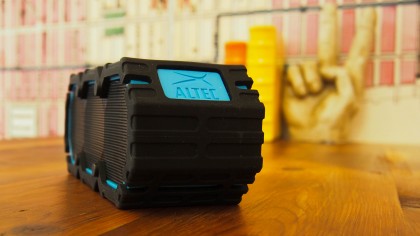
Later on, I tested it indoors to see if the sound quality improved. The bass and mids did perform marginally better with some walls to confine the sound waves. But on the whole, if you're serious about sound performance, the LifeJacket isn't what you're looking for. That said, this speaker gets mighty loud and does so without distortion on the low and high end.
Where the LifeJacket shows its stuff is with battery life. It's advertised to dole out music for 16 hours before needing a charge and in my experience, I had a hard time running this thing out of juice. It was my music companion after work for a few days and during some chores over the weekend before it played its last tune just shy of an incredible 18 hours.
Final verdict
The Altec LifeJacket is a Bluetooth speaker built with misguided design choices. Sometimes, it's brilliant, especially when it comes to durability and battery life. However, its poor sound performance and tacky design are harsh reminders that this speaker is only as good as its weakest component.
The TDK TREK Flex is a step above the LifeJacket in almost every way. Not only is that speaker also water and dustproof, it boasts elegant looks, offers a near 360-degree listening experience and you'll find it cheaper at $129.
However, the LifeJacket thoroughly beats out the TREK Flex in terms of its durability. If you're in need of a speaker that won't buckle under the elements during rough, outdoor expeditions, the LifeJacket is worth your money, but be sure to find it on sale.
Cameron is a writer at The Verge, focused on reviews, deals coverage, and news. He wrote for magazines and websites such as The Verge, TechRadar, Practical Photoshop, Polygon, Eater and Al Bawaba.
